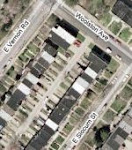Today we are the 6th largest city in the US, and clearly not the leader in media or business that we once were. We have fabulous cultural and educational institutions, yet we are not in the group of world class cities such as New York, Paris, or Tokyo.
I thought about this as I passed the archaeological dig near Independence Hall. It is the site of the President's house before the young republic created the new Federal City and built The White House. I wondered, why did this new nation relocate its capital from this important city to a mosquito-infested swamp on the Potomac?
 One reason is that more than a few of our founding generation feared that having the seat of political power well inside the then-center of financial power was inherently dangerous. We should remember that the issue in the early years of our republic was fear of concentration of power. Everything in our Constitution was placed there due to that fear. Federalism, enumerated boundaries of central authority, a bicameral legislature, defined terms of office, and the Bill of Rights all existed for one purpose only - to prevent abuse of power.
One reason is that more than a few of our founding generation feared that having the seat of political power well inside the then-center of financial power was inherently dangerous. We should remember that the issue in the early years of our republic was fear of concentration of power. Everything in our Constitution was placed there due to that fear. Federalism, enumerated boundaries of central authority, a bicameral legislature, defined terms of office, and the Bill of Rights all existed for one purpose only - to prevent abuse of power.Thomas Jefferson and John Adams were heroes of the Revolution against monarchy and for governing at the consent of the governed. And yet, even their individual unchecked power would have bathed the new nation in blood. Jefferson, the unyielding proponent of public education and a skeptic about the power of organized religion, praised the French Revolution long after it degenerated into mindless slaughter. Ever the romantic revolutionary, he would have welcomed something similar here as a periodic necessity. Adams is largely responsible for the independence of the judiciary. He lectured incessantly about the need for checks and balances on abuse of government power. But he passed the short-lived Alien and Sedition Acts, which fined, jailed, and deported people for criticizing the government.
Bad for my hometown, but good for the nation, they made the right decision to move the capital. Because even noble abolitionist Quakers living in the “Athens on the Delaware” would have mixed with the emerging banking and industrial families and eventually abused their power. So whichever groups of forthright people with high-minded intentions one finds heroic and selfless, whether the NSA or the NEA, whether big oil with tax breaks or the new subsidized corn oil millionaires, mixed with enough money, all bureaucracies and constituencies will eventually abuse their power.



2 comments:
RIP Rich
Rich, my friend, I miss you. I wish I had been a better friend. I wish I had stayed in closer touch with you. I wish I knew what you were feeling. I wish I had let you know how much I appreciated our friendship and the times we danced and laughed together. Rich, you were such a cool guy. So laid back, so whatever. I loved that about you. You never kept score. I could always be myself when I was with you. I wish I could understand what you did. I wish I could make sense of anything right now. Rich. Why? May God take you by the hand and grace you with love and kindness. May He wipe away your fears, your sadness, your confusion. May He show you that you are special and loved and bring you into His kingdom. May you be experiencing the glory and grace that I only still dream about. Rich, I love you. I wish you were still with us.
Your friend forever,
Renee
Post a Comment